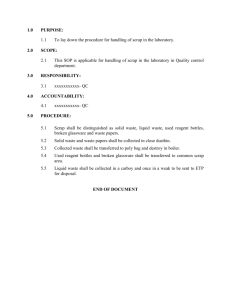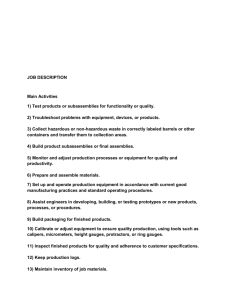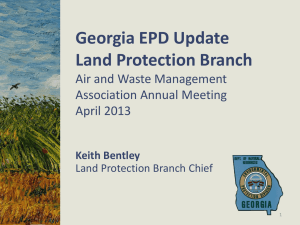105.01 Appendix 8
advertisement
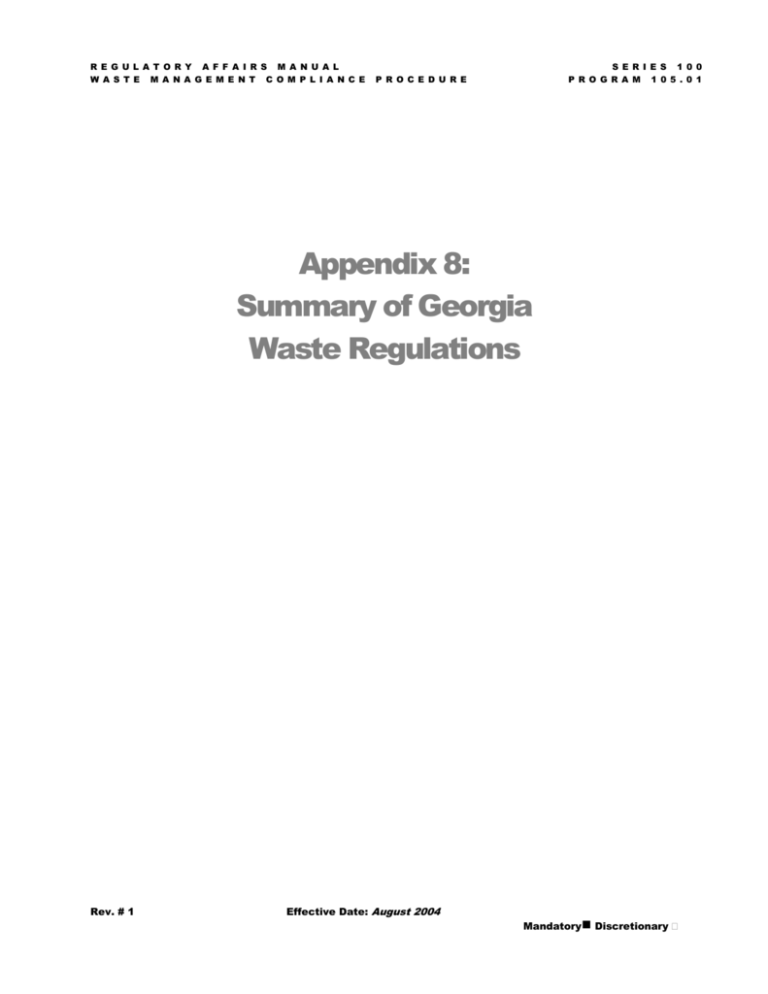
R E G U L A T O R Y A F F A I R S M A N U A L W A S T E M A N A G E M E N T C O M P L I A N C E S E R I E S 1 0 0 P R O G R A M 1 0 5 . 0 1 P R O C E D U R E Appendix 8: Summary of Georgia Waste Regulations Rev. # 1 Effective Date: August 2004 Mandatory Discretionary R E G U L A T O R Y A F F A I R S M A N U A L W A S T E M A N A G E M E N T C O M P L I A N C E 1 P R O C E D U R E S E R I E S 1 0 0 P R O G R A M 1 0 5 . 0 1 INTRODUCTION TO STATE WASTE REGULATIONS 1.1 Purpose This appendix is designed to supplement the Federal regulatory information contained in the Waste Management Compliance Guide to assist Fisher Scientific facilities with managing hazardous waste in accordance with the regulations on the State level that differ from Federal regulations under the Resource Conservation and Recovery Act (RCRA). The majority of states, including Georgia, have been authorized to administer the RCRA program, and many of them have added more stringent standards to the federal regulations; this appendix provides a guide for these more stringent regulations. There may be additional regulations on a local level that also apply to a facility, and it is essential to be familiar with these as well. This material is designed to cover the Georgia requirements for both large and small quantity generators since Fisher Scientific facilities fall into both categories. However, this manual does not provide a comprehensive description of treatment, storage and disposal facility (TSDF) requirements for those facilities with Part B permits (no Fisher facilities have Part B permits). 1.2 Overview The Environmental Protection Division of the Georgia Department of Natural Resources, (EPD, available on-line at http://www.dnr.state.ga.us/dnr/environ) administers the state and federal regulations. The state regulations are equivalent to the federal rules for hazardous waste generators, with additional requirements for generators including: Biomedical Waste ( see Section 2); Scrap Tires (see Section 2); Lead Acid Batteries (see Section 2); and Hazardous Waste Manifest Requirements (see Section 3). Generator requirements in on-site storage, transporting hazardous waste, emergency reports, exception reports, recordkeeping requirements, training, emergency preparedness and prevention, and waste minimization requirements do not differ from Federal regulations. Rev. # Georgia Effective Date: August 2004 App. 8-2 Mandatory Discretionary R E G U L A T O R Y A F F A I R S M A N U A L W A S T E M A N A G E M E N T C O M P L I A N C E S E R I E S 1 0 0 P R O G R A M 1 0 5 . 0 1 P R O C E D U R E 1.3 Applicability to Fisher Scientific The Georgia state regulations can be found in the Georgia Hazardous Waste Management Act, Georgia Administrative Rule Chapter 391-3-11 Hazardous Waste Management. The requirements for facilities that generate hazardous waste are detailed in Chapter 391-3-11-.08: Standards Applicable to Generators of Hazardous Waste. As generators of hazardous waste, Fisher Scientific facilities are subject to the federal RCRA regulations as well as any applicable state regulations. 1.4 Registration Every hazardous waste generator, transporter, and owner or operator of a hazardous waste storage, treatment, or disposal facility shall notify the EPD of such activities within 30 days after commencing waste generation. As generators of hazardous waste, Fisher Scientific facilities located in Georgia must register with the EPD and the EPA using Form 8700-12. The most recent version of the form and instructions are available at http://www.epa.gov/epaoswer/hazwaste/data/form8700/forms.htm and the facility must: List all the wastes generated on-site; and List all the hazardous waste activities (i.e., generator, transporter, and treatment, storage, or disposal). This form and associated instructions are designed to determine if the facility is subject to the requirements under the Resource Conservation and Recovery Act (RCRA) for notifying the State of Georgia of regulated waste activities. The instructions will assist the facility in obtaining an U.S. EPA Identification Number by completing and submitting EPA Form 8700-12 for initial notifications, or in revising EPA Form 8700-12 for subsequent notifications. The facility is required to complete an EPA Form 8700-12 whenever any of the facility information contained on the form changes. The instructions also include appendices on typical waste streams produced by small quantity generators and typical waste streams and EPA Hazardous Waste Numbers. Upon review of the form, EPA will assign an identification number to each facility. This identification number must be used on all correspondence with federal or state agencies, as well as on all labels, manifests, and regulatory reports. The EPA ID number for this facility is: . . Rev. # Georgia Effective Date: August 2004 App. 8-3 Mandatory Discretionary R E G U L A T O R Y A F F A I R S M A N U A L W A S T E M A N A G E M E N T C O M P L I A N C E 2 S E R I E S 1 0 0 P R O G R A M 1 0 5 . 0 1 P R O C E D U R E WASTE IDENTIFICATION AND CLASSIFICATION 2.1 Infectious/Medical Waste Georgia defines biomedical waste to include the following: biological waste, which means blood and blood products; and sharps, which means any discarded article that may cause punctures or cuts. A facility is defined as one or more persons generating biomedical wastes. Facilities which generate less than 100 pounds per month of biomedical waste are exempt from most regulations except storage requirements. Containment of biomedical waste shall be in a manner and location which affords protection from animals, rain and wind, does not provide a breeding place or a food source for insects and rodents, and minimizes exposure to the public. Biomedical waste shall be segregated by separate containment from other waste at the point of origin. Rigid containers of discarded sharps and all other disposable containers used for containment of biomedical waste shall be red or orange in color or clearly identified with the universal biohazard symbol or clearly marked with the word "Biohazard". Biomedical waste from generators of less than 100 pounds per month shall be properly disposed of at a state permitted municipal solid waste landfill or treatment facility. 2.2 Scrap Tires A scrap tire generator is any person or facility who generates scrap tires. Generators may include private company vehicle maintenance shops and garages. Any person who generates scrap tires shall have a Scrap Tire Generator Identification Number (ID #) issued by the EPD. The application form for this Identification Number is available on-line at: http://www.dnr.state.ga.us/dnr/environ/forms-files/lpb/st-02.pdf The ID # shall be used on scrap tire shipment manifests. Separate ID numbers shall be required for generators having multiple generation locations. Generators shall initiate a manifest to transport scrap tires from the point of generation to an end user or to a scrap tire processing or disposal facility approved by the EPD. The manifest shall include the following information: Rev. # Georgia name and ID # of the generator; number or total tons (accurate to within 10 percent of actual number) of scrap tires to be transported; name and permit number of the scrap tire carrier; date of transport; and Effective Date: August 2004 App. 8-4 Mandatory Discretionary R E G U L A T O R Y A F F A I R S M A N U A L W A S T E M A N A G E M E N T C O M P L I A N C E P R O C E D U R E S E R I E S 1 0 0 P R O G R A M 1 0 5 . 0 1 destination of scrap tires. Unless otherwise approved in writing by the EPD, generators shall assure that any person collecting and transporting their scrap tires hold a valid Scrap Tire Carrier Permit issued by the EPD, provided, however, that a person who generates less than 100 tires per month and who transport only their own scrap tires to approved end users, processors, recyclers, or disposers are not required to have a Scrap Tire Carrier Permit, but must comply with all other provisions required of generators and scrap tire carriers. Generators shall maintain receipts (copies of the completed manifest) for a period of three (3) years. A generator shall report to the EPD any carrier who fails to return a properly completed manifest to the generator within 30 days of scrap tire pickup. Such report shall be filed within 30 days. A generator can never store more than 100 scrap tires. 2.3 Lead Acid Batteries Lead acid batteries are specifically prohibited from disposal at solid waste disposal facilities in Georgia. 2.4 Used Oil Georgia has adopted the Federal definition of "used oil", which is "any oil that has been refined from crude oil, or any synthetic oil, that has been used and as a result of such use is contaminated by physical or chemical impurities.” (40 CFR 279.1) Georgia has no additional requirements for the management of used oil. Rev. # Georgia Effective Date: August 2004 App. 8-5 Mandatory Discretionary R E G U L A T O R Y A F F A I R S M A N U A L W A S T E M A N A G E M E N T C O M P L I A N C E 3 G U I D E S E R I E S 1 0 0 P R O G R A M 1 0 5 . 0 1 UNIFORM HAZARDOUS WASTE MANIFEST Hazardous Waste Manifests shall be on forms as designated by the EPD and shall be completed as required by the instructions supplied. Manifests can be obtained by contacting the EPD at 888.373.5947 (toll free outside metro Atlanta), or: Georgia Environmental Protection Division 2 Martin Luther King Jr. Drive, Suite 1152 East Tower Atlanta, Georgia 30334 Telephone: 404.657.5947 Rev. # Georgia Effective Date: August 2004 App. 8-6 Mandatory Discretionary

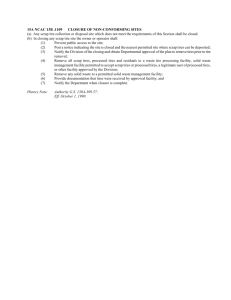
![You`re invited to celebrate [child`s name]`s birthday at SCRAP! What](http://s3.studylib.net/store/data/007177272_1-c15601fb9e11b26854f13f1982e634e8-300x300.png)

